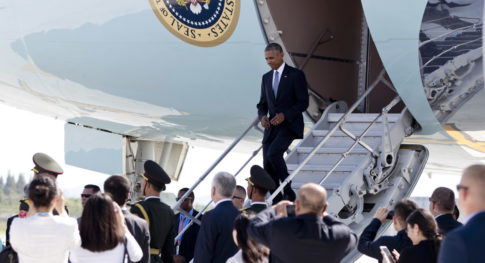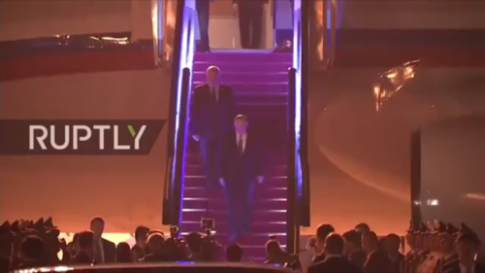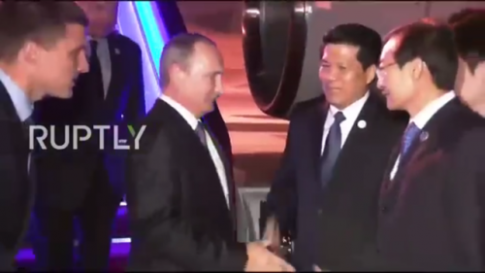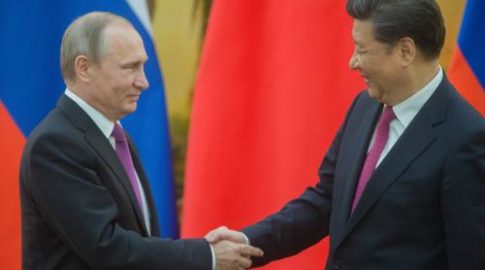– After Snubbing Obama, China Gives Putin Red Carpet Treatment, Warns Against Protectionism At G-20:
Roughly at the same time as China’s infamous snub of Obama‘s arrival at Hangzhou for the G-20 summit, when the G-20 host nation’s delegation first made sure there was no staircase for Obama to exit the plane and descend on the red carpet; forcing the president of the world’s most powerful nation to use an emergency exit…
… followed by a shouting match by a Chinese official who unleashed on the US Press corps and national security advisor Susan Rice, blocking them from crossing a blue rope holding back press and saying “This is our country. This is our airport”, Chinese officials had no such problems greeting Russian president Vladimir Putin with full honors, whose arrival – on the red carpet – took place without a glitch.
#G20China – Russian President Vladimir Putin arrives in China for G20 summit https://t.co/R3c03SyRflpic.twitter.com/MsVMTIblxg
— Ruptly (@Ruptly) September 3, 2016
The favor was returned: according to RT, Putin brought a box of Russian ice-cream as a gift to Chinese leader Xi Jinping: “I promised you I’d bring some ice-cream,” Putin said. “I’ve brought for you a box of it as a gift.” Xi Jinping is a real fan of Russian ice-cream. “Thank you very much for the gift, for the tasty ice-cream. In my every trip to Russia I always ask to buy Russian ice-cream. And then, at home, we eat it,” the Chinese leader said.
“You have the best cream, and it makes it so tasty. I like it very much. Thank you for this courtesy,” he added.
* * *
Having brought no ice cream of his own, and his embarrassing arrival in China making front page news over the weekend, Obama quickly tried to talk down the embarrassing incident, saying the tensions were the result of different approaches to the media, as well as the sheer scale of the US operation when he travels, according to AFP. Obama pivoted away from the snub, instead accusing China of once again showing little respect for human rights: “Washington stands up for press freedom and human rights and – whatever the fallout – does not leave our values and ideals behind when we take these trips” he said.
“It can cause some friction. The seams are showing a little more than usual in terms of some of the negotiations and jostling that takes place behind the scenes,” Obama told reporters on Sunday.
The justification continued: “Part of it is we also have a much bigger footprint than a lot of other countries. And we’ve got a lot of planes, a lot of helicopters, a lot of cars, a lot of guys. You know, if you’re a host country, sometimes it may feel a little bit much.”
Obama said it was not the first time Washington’s differences with Beijing had erupted during a visit, and that clashing values were also on display in his discussions with Xi.
Obama concluded by expressing hope the world would quickly move on and forget China’s snub of Obama on his last official visit to the country: “And so I wouldn’t over-crank the significance of it,” he said.
“None of this detracts from the broader scope of the relationship (with China),” he told a news conference. “The bilateral discussions that we had yesterday were extremely productive and continue to point to big areas of cooperation.”
* * *
Obama’s “explanation” aside, China took the initiative to continue piling its critisim of the US, when Chinese President Xi Jinping said at the open of a two-day G-20 summit that the global economy is being threatened by rising protectionism and risks from highly leveraged financial markets. He was referring to recent US trade war escalations, and Washington’s recent response to Chinese dumping with duties on cold-rolled steel as high as 522%. As for highly leveraged financial markets, pretty much anyone could be at fault there.
His warning on Sunday followed bilateral talks with Barack Obama that the U.S. president described as “extremely productive”, but which failed to bring both sides closer on thornier topics such as tensions in the South China Sea.
In addition to the previously leaked communique details, which as reorted last night will call for more fiscal and monetary stimulus, observers expect G20 leaders to mount a defense of free trade and globalization and warn against isolationism, eyeing Britain’s vote in June to exit the
European Union and before the U.S. presidential election in November. The global economy has arrived “at a crucial juncture”, Xi said, in the face of sluggish demand, volatile financial markets and feeble trade and investment.“Growth drivers from the previous round of technological progress are gradually fading, while a new round of technological and industrial revolution has yet to gain momentum,” he said.
Xi’s speech is presented below:
Chinese President #XiJinping delivers welcoming speech at the #G20 banquet pic.twitter.com/JWelcq2q1O
— CCTVNEWS (@cctvnews) September 4, 2016
As Reuters confirmed last night’s report, G20 countries are set to agree in a communique at the end of the summit that all policy measures – including monetary, fiscal and structural reforms – should be used to achieve solid and sustainable economic growth, Japanese Deputy Chief Cabinet Secretary Koichi Hagiuda said. “Commitment will be made to utilizing all three policy tools of monetary and fiscal policies and structural reforms to achieve solid, sustainable, balanced and inclusive growth,” Hagiuda told reporters on the sidelines of the summit; what he was really doing is hinting that the BOJ may no longer abide by the demands of the US Treasury to not engage in significant currency devaluations potentially leading to a major surprise announcement out of the BOJ in its September meeting.
Xi also called on G20 countries to match their words with actions. “We should turn the G20 group into an action team, instead of a talk shop,” he said. Considering that the G-20 has been equated with the UN in terms of efficiency, we hope Xi isn’t holding his breath.
* * *
Meanwhile, some of the G20 leaders have begun drawing battle lines in disputes over issues ranging from trade and investment to tax policy and industrial overcapacity, suggesting there was far less smiling by world leaders going on behind the scenes.
According to Reuters, Xi held talks with Australian Prime Minister Malcolm Turnbull and told him he hoped Australia would continue to provide a fair, transparent and predictable policy environment for foreign investors. China was angered when Australia blocked the A$10 billion ($7.7 billion) sale of the country’s biggest energy grid to Chinese bidders last month.
China has accused Australia of bowing to protectionist sentiment in blocking the bid for Ausgrid, as well as an earlier one by a China-led consortium to buy cattle company Kidman & Co. Beijing has also criticized Australia, a staunch U.S. ally, for running surveillance flights over disputed islands in the South China Sea.
Meanwhile, European Commission President Jean-Claude Juncker shot back at China saying the G-20 host nation must set up a mechanism to address its problem of industrial overcapacity, adding it was “unacceptable” the European steel industry had lost so many jobs in recent years. “Overcapacity is a global problem but there is a particular Chinese element,” he told a news conference.
* * *
Britain’s future after its departure from the European Union was also subject to discussion. Obama reassured Prime Minister May that Britain’s closest political, commercial and military ally would stand by her, tentatively backing off his infamous line that Brexit would leave the UK “in the back of the queue.” However, Obama did not shrink away from his stance that Brexit was a mistake and that London would not be able to jump the queue to arrange a bilateral trade deal.
Juncker said that if Britain wanted access to the European Union’s common market, it needed to respect the rules of the common market. Turnbull, meanwhile, said Australia wanted an early free trade agreement with Britain so markets could remain open between them when Britain formally left the European trading bloc.
* * *
Snubbed or not, Obama held talks with Xi on Saturday that ran late into the night focusing mostly on the recent geopolitical tensions surrounding the disputed islands. He urged Beijing to uphold its legal obligations in the disputed waters of the South China Sea, and stressed U.S. commitments to its regional allies. Xi responded by saying China would continue to safeguard its sovereignty and maritime rights in the South China Sea. But China is keen to keep the summit focused on economic issues and to prevent other disputes from overshadowing it.
According to a “fact sheet” on China-U.S. relations issued on Sunday, the two sides agreed on a range of issues, including avoiding competitive currency devaluations and not limiting deal opportunities for foreign information and communication technology providers.
Obama, in the last five months of his presidency, is using the visit to put a final stamp on his signature policy shift toward the Pacific, setting the tone for his White House successor, who will be elected in November and take office on Jan. 20. Judging by this weekend’s incidents, Chinese opinion of the highest US political institutions has never been lower.
Perhaps just as bizarre as the now infamous Obama snub, however, was China’s decision to convert parts of the city of Hangzhou, with its 9 million people, into a virtual ghost town as China sought to ensure that the G20 summit stays incident-free.
@zerohedge from the Internet. Globalist @BarackObama arrives in Hangzhou pic.twitter.com/Orri4Ja40Q
— Beantown WahooWa (@xm_rn) September 4, 2016
* * *
PayPal: Donate in USD
PayPal: Donate in EUR
PayPal: Donate in GBP





Barack Obama cancels meeting after Philippines president calls him ‘son of a whore’
https://www.theguardian.com/world/2016/sep/05/philippines-president-rodrigo-duterte-barack-obama-son-whore